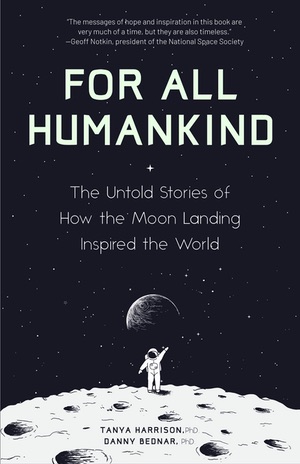Review: For All Humankindby Jeff Foust
|
| “Regardless of where our interviewees came from, the overarching theme was that of inspiration from seeing humanity overcome challenges,” the authors write in the book’s epilogue. |
The new book For All Humankind offers some examples of that global interest in the mission. Authors Tanya Harrison and Danny Bednar profile eight relatively ordinary people from around the world, all outside the United States, who offer their recollections of the Apollo landing. They range from a Lithuanian-born Holocaust survivor working as an engineer in Canada to a space-crazed teenager in England to an engineering student in Sudan who watched the landing on his university’s only television and then raced home to tell his uncle, who didn’t believe him at first. Some watched or listened to the landing live, while others didn’t hear about it until the next day.
The book’s subtitle about how the Apollo 11 landing “inspired the world” might lead the reader to think that the people profiled in the book changed their lives because of the landing; that is, were inspired by the landing to do something they might not otherwise have done. That is, by and large, not the case. Elly, the Holocaust survivor in Canada, later decided to get his pilot’s license after the mission, but he had long been interested in flight. Phil, the English teenager who kept scrapbooks about the Apollo program, used the landing to accelerate his interest in the Moon, eventually becoming a planetary scientist. But others, like Indian schoolgirl Leena, have strong memories about the landing, but the event didn’t change their lives or careers in any obvious way.
Besides the recollections of people from around the world, For All Humankind includes a primer about the Apollo program (which can be safely skipped by most readers of this publication, since it’s just a basic introduction to the program for who know little about it) and an epilogue that summarizes the rest of the program and puts it into perspective. “Regardless of where our interviewees came from, the overarching theme was that of inspiration from seeing humanity overcome challenges,” Harrison and Bednar write in that epilogue. To those people, the Apollo 11 landing had nothing to do about winning the Space Race, but rather the inspiration of overcoming challenges to achieve an audacious goal. “Together, we can overcome any challenge in front of us, for our own betterment, and for all humankind.” That’s a message that can be particularly inspiring as humanity faces a new, and very different, challenge today.
Note: we are temporarily moderating all comments submitted to deal with a surge in spam.
